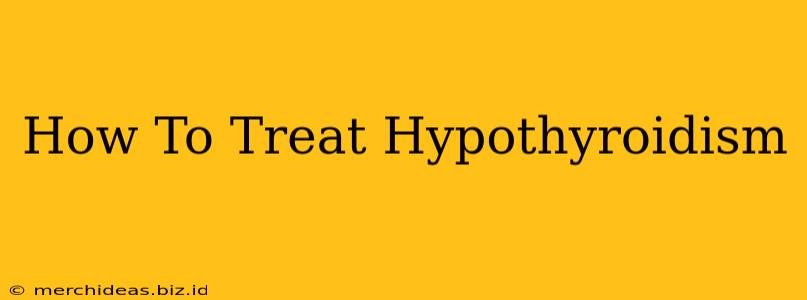Hypothyroidism, also known as an underactive thyroid, affects millions worldwide. This condition occurs when your thyroid gland doesn't produce enough thyroid hormones, leading to a slowdown in your body's metabolism. Understanding how to treat hypothyroidism is crucial for managing symptoms and improving your overall well-being. This comprehensive guide will explore various treatment options, lifestyle adjustments, and important considerations for effectively managing this condition.
Understanding Hypothyroidism: The Root of the Problem
Before delving into treatment, it's essential to understand the underlying cause of your hypothyroidism. Several factors can contribute, including:
- Hashimoto's Thyroiditis: An autoimmune disease where your immune system attacks your thyroid gland.
- Thyroid Surgery: Removal of all or part of your thyroid gland.
- Radiation Therapy: Treatment for certain cancers that can damage the thyroid.
- Congenital Hypothyroidism: A rare condition present at birth.
- Iodine Deficiency: Lack of iodine in your diet, which is crucial for thyroid hormone production.
- Certain Medications: Some medications can interfere with thyroid function.
The Cornerstone of Hypothyroidism Treatment: Hormone Replacement Therapy
The primary treatment for hypothyroidism is hormone replacement therapy, typically involving levothyroxine (Synthroid, Levoxyl, Unithroid). This synthetic hormone replaces the thyroid hormone your body is lacking.
Finding the Right Dosage: A Collaborative Approach
Determining the correct dosage of levothyroxine is crucial. Your doctor will monitor your TSH (thyroid-stimulating hormone) levels through blood tests to adjust your dosage accordingly. This process often involves a trial-and-error approach, with adjustments made over several weeks or months to find the optimal level that manages your symptoms effectively.
Optimizing Levothyroxine Absorption: Key Considerations
To maximize the effectiveness of levothyroxine, remember these important tips:
- Take it on an empty stomach: Ideally, take your medication at least 30-60 minutes before breakfast. Food can interfere with absorption.
- Consistency is key: Take your medication at the same time each day to maintain consistent hormone levels.
- Avoid certain medications: Some medications, like calcium supplements and antacids, can interfere with levothyroxine absorption. Consult your doctor about potential interactions.
- Inform your doctor about changes: If you experience any new symptoms or your condition worsens, inform your doctor immediately.
Beyond Medication: Lifestyle Adjustments for Better Management
While medication is fundamental, lifestyle modifications can significantly complement your treatment and improve your overall health.
Dietary Changes: Fueling Your Thyroid
- Iodine-rich foods: Include foods like seaweed, iodized salt, and seafood in your diet (but be mindful of potential mercury content in seafood).
- Selenium-rich foods: Selenium plays a crucial role in thyroid hormone production. Incorporate Brazil nuts, tuna, and eggs into your diet.
- Balanced nutrition: Focus on a balanced diet rich in fruits, vegetables, whole grains, and lean protein.
Stress Management: A Crucial Factor
Chronic stress can exacerbate hypothyroidism symptoms. Incorporate stress-reducing techniques such as:
- Regular exercise: Engage in moderate physical activity most days of the week.
- Yoga and meditation: These practices can help reduce stress and promote relaxation.
- Sufficient sleep: Aim for 7-8 hours of quality sleep per night.
Monitoring Your Progress: Regular Check-ups
Regular monitoring is essential to ensure your treatment is effective and to detect any potential complications. Your doctor will schedule regular blood tests to monitor your TSH levels and adjust your medication dosage as needed.
When to Seek Medical Attention
Seek immediate medical attention if you experience any of these symptoms:
- Severe fatigue
- Weight gain
- Depression or anxiety
- Difficulty concentrating
- Constipation
- Cold intolerance
- Swelling in your face, neck, or hands
- Hoarseness
Conclusion: Taking Control of Your Hypothyroidism
Managing hypothyroidism effectively requires a collaborative approach between you and your healthcare provider. By adhering to your prescribed medication, making necessary lifestyle adjustments, and maintaining regular check-ups, you can significantly improve your symptoms and overall quality of life. Remember, you're not alone in this journey, and with proper management, you can live a full and active life.
